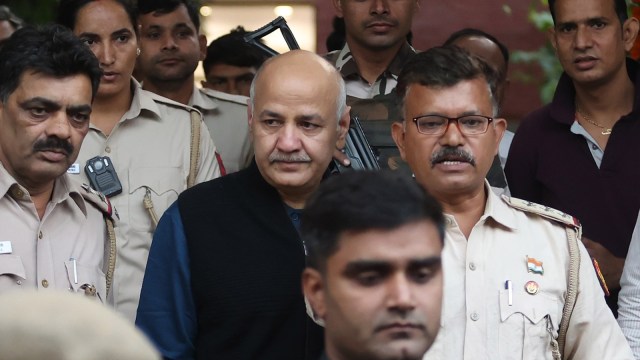Excise policy case: Delhi High Court seeks CBI, ED response on Manish Sisodia’s bail pleas
Former Delhi deputy chief minister and AAP leader Manish Sisodia has moved the high court against the trial court’s April 30 verdict denying him bail in the money laundering and graft cases registered by the ED and CBI.
 Former Chief Minister of Delhi Manish Sisodia himself has moved 13 applications before the court which, in its order, also provided a list of 135 applications moved by the 31 accused. (Express Photo)
Former Chief Minister of Delhi Manish Sisodia himself has moved 13 applications before the court which, in its order, also provided a list of 135 applications moved by the 31 accused. (Express Photo)The Delhi High Court has sought the response of the Enforcement Directorate (ED) and the Central Bureau of Investigation (CBI) on the bail pleas of former deputy chief minister and AAP leader Manish Sisodia in connection with the excise policy case.
A single-judge bench of Justice Swarana Kanta Sharma issued notice to the ED and the CBI and listed both the bail petitions on May 8.
Additionally, advocate Zoheb Hossain appearing for the ED said that he has “no objection” to the “arrangement” made on February 5 “to continue”, by which the trial court had permitted Sisodia to meet his ailing wife once a week while in custody.
The high court said that the arrangement shall continue, thereby permitting Sisodia to meet his wife once a week while in “custody parole”. Sisodia had, apart from filing the bail petition, also moved the high court seeking that the February 5 order be permitted to continue, during the pendency of his bail petition.
Senior Advocate Dayan Krishnan, appearing for Sisodia, submitted that there was another order passed in March in which Sisodia had moved the trial court saying that he “cannot bear the expenses of custody parole, therefore let the state take care of it”, and that the same was granted. At this stage, the high court said that this order shall also continue to operate.
Sisodia has moved the high court against the trial court’s April 30 verdict denying him bail in the money laundering and corruption cases registered by the ED and CBI, respectively.
While denying bail to Sisodia, the trial court had observed on Tuesday that the accused were delaying the trial in the excise policy case by filing frivolous applications.
The court of Special Judge Kaveri Baweja noted that while scrutinising the documents, almost all the accused in the excise policy case requested hard copies of the documents relied upon after the Supreme Court denied bail to Sisodia in October 2023. “…it is thus apparent that the applicant individually, and along with different accused have been filing one or the other application/ making oral submissions frequently, some of them frivolous, that too on a piecemeal basis, apparently as a concerted effort for accomplishing the shared purpose of causing delay in the matter,” Judge Baweja noted.
Sisodia himself has moved 13 applications before the court which, in its order, also provided a list of 135 applications moved by the 31 accused.
The trial court had also noted that Sisodia’s wife had multiple sclerosis for a long time and had been undergoing treatment. It was held that the Aam Aadmi Party (AAP) leader had disclosed no “imminent or urgent” need warranting his release on these grounds.
The trial court had said that the “steady progression of the case”, despite apparent attempts to slow down its progress, cannot, by any standards, be equated with “snail’s pace.”
Sisodia had filed a bail plea in Delhi’s Rouse Avenue Court a few months after the Supreme Court rejected it. The ED, which is investigating the money laundering aspect of the excise policy case, informed the apex court that the trial would be completed within six to eight months. However, six months have passed since then, and the charges in the excise policy case are yet to be framed.
The AAP leader was accused of interfering in the formulation of the Delhi excise policy in an extra-procedural manner. It was alleged that he made changes to the policy to benefit specific liquor entities, resulting in a loss of several hundred crores to the state treasury. According to the ED’s allegations, wholesale distributors received a fixed fee of Rs 581 crore due to an increase in the commission (distribution fee) from 5 per cent under the previous policy to 12 per cent under the new excise policy, which was later cancelled.







